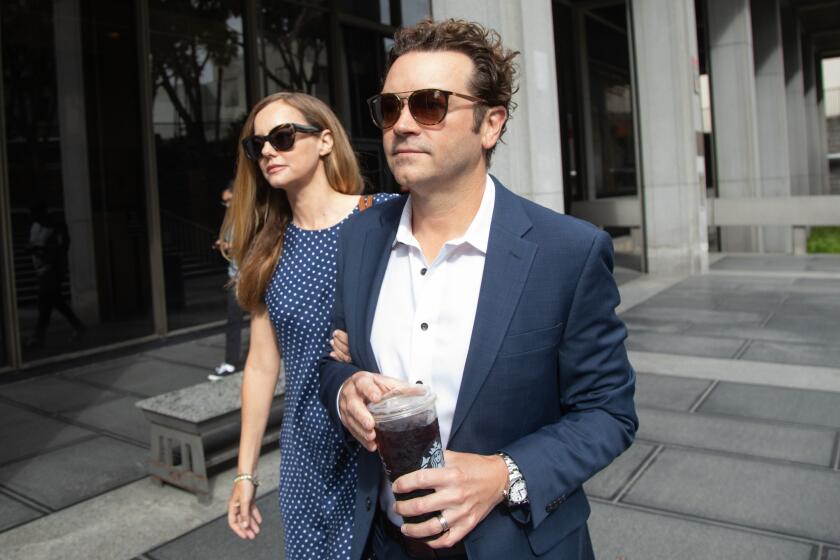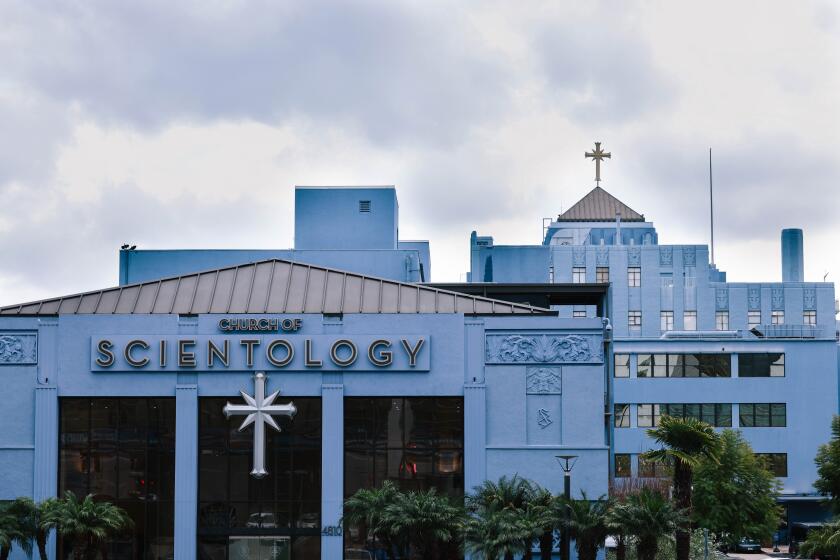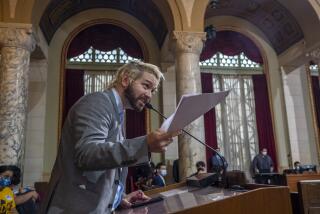Judge ‘troubled’ by Danny Masterson’s attorneys tracking down jurors after rape trial

Attorneys working for Danny Masterson contacted jurors from the actor’s rape trial despite a judge’s order meant to limit publicly available information about their identities, drawing alarm from the jurors and Masterson’s victims, court records show.
In an order made public in September, Los Angeles County Superior Court Judge Charlaine Olmedo said she was “troubled” by the conduct of the attorneys, who on multiple occasions contacted jurors at their homes and businesses to interview them as part of Masterson’s effort to appeal his 2023 conviction.
The former star of the sitcom “That 70s Show,” Masterson is serving a sentence of 30 years to life in state prison for sexually assaulting three fellow members of the Church of Scientology in the early 2000s.
One of the actor’s lawyers, Shawn Holley, said three jurors had agreed to meet voluntarily. She said nothing “harassing or improper” had occurred, and all three jurors volunteered their cellphone numbers when contacted.
But the judge said she had received complaints from jurors who “felt pressured by the defense team,” and said they were “not first advised that they had the absolute right to not discuss the case if they did not want to do so.”
Olmedo wrote she was “troubled that they were approached at their homes.”
Court filings show some jurors emailed Olmedo earlier this year saying they were “concerned” and believed Masterson’s lawyers weren’t supposed to know where they lived or worked.
Danny Masterson was convicted in his second trial on charges he raped three women he met through the Church of Scientology in the early 2000s.
Last week, prosecutors asked Olmedo to hold a hearing to consider sanctioning Masterson’s attorneys. It would mark the second round of disciplinary hearings against members of his legal team in two years. The motion named Holley, her co-counsel Phillip Cohen and two other attorneys working for Masterson, Clifford Gardner and Eric Multhaup.
One juror’s email attached to Olmedo’s ruling said a woman who identified herself as “a member of Mr. Masterson’s habeas team” appeared on their lawn on Sept. 15.
The foreperson of the jury that convicted Masterson said Holley, one of the actor’s lead defense attorneys, called them at their job last year, two months after they returned a guilty verdict, according to an email submitted to the court.
Olmedo wrote that several jurors had been the subject of “unwanted contact at their homes or work by members of the defense team” and they had asked her to “inquire how the defense team obtained their identifying information.”
In her September order, Olmedo forbade the attorneys from directly contacting jurors.
Holley said she’d done nothing wrong and is no longer directly involved in Masterson’s case. Gardner and Cohen, who also said he is no longer engaged in the case, said they had not contacted any jurors.
Multhaup confirmed one of his investigators approached a juror at their home on Sept. 15 and “comported herself in complete compliance with [the California] Code of Civil Procedure.” He disputed the idea that jurors’ identities were meant to be kept secret, arguing Olmedo’s ruling only hid information contained in “the forms that the jurors fill out relating to their jury service.”
Under the state Code of Civil Procedure, defendants and their legal teams have the right to discuss a verdict with a juror, provided the juror consents to the conversation and the discussion happens at a “reasonable time and place.”
Multhaup said his investigator simply located the juror through routine research, and contacted them prior to the terms of Olmedo’s order taking effect on Sept. 17.
“In short, up until September 17, it was fine for defense representatives to contact jurors directly, subject to ... requirements of reasonable time and place,” he said. “Broad daylight is eminently reasonable.”
Holley said she’s spoken with three jurors, including the foreperson, since trial.
“I made it clear to all 3 jurors with whom I spoke—and ultimately met— that they were under no obligation to speak with me or to meet with me, and they all were more than willing to do so. I met all 3 of them [separately] at times and places which were convenient for them and I was cordial and respectful of their time and boundaries,” Holley said in an email to The Times. “I feel confident that none of the 3 jurors with whom I spoke/met reported our interaction to Judge Olmedo as harassing or improper.”
Holley said she was able to figure out where some of the jurors worked based on information they provided in open court during jury selection, details that would not have been covered by Olmedo’s sealing order.
Masterson’s case has been marked by repeated allegations of attorney misconduct and outside interference.
Last June, Olmedo sanctioned two of of Masterson’s former lawyers, Thomas Mesereau and Sharon Applebaum, for improperly sharing discovery from the trial with the Church of Scientology. News of the sharing of the materials — which included private conversations between Masterson’s victims and police as well as the victims’ home addresses — drew panic from the women at the center of the case, who have accused the church of a years-long campaign of harassment in a civil suit. The church has denied all wrongdoing in that case.
A lawsuit accuses Scientology of “harassment and intimidation” around the Danny Masterson trial. A church spokesperson called the claims “categorically false.”
Earlier this year, The Times reported on allegations that the church attempted to “derail” the case against Masterson by harassing law enforcement officials involved in his criminal trial. A break-in was reported at the home of the lead prosecutor, Deputy Dist. Atty. Reinhold Mueller, who also claimed he was harassed and nearly “run off the road” in the lead-up to the trial, according to a civil lawsuit, police reports and a video reviewed by The Times.
Los Angeles police detectives assigned to the case also claimed they’d been followed and harassed by church agents, according to a 2023 interview with former LAPD Chief Michel Moore. But an LAPD investigation failed to substantiate those claims, Moore said at the time.
The church has said there is “zero evidence” to support such claims, and previously accused law enforcement of having a bias against the religion. Neither Olmedo’s order nor the prosecution’s sanction motion mentioned the church in relation to the incidents with the jurors.
In a statement issued Tuesday, the church denied any wrongdoing.
“There is not a scintilla of evidence supporting the scandalous allegations that the Church harassed the accusers. Every single instance of supposed harassment by the Church is FALSE,” spokeswoman Karin Pouw wrote in an email to The Times. “We have information from the D.A.’s Office, the City Attorney’s Office and the LAPD confirming that the Church was not investigated or even a suspect with respect to any of the incidents alleged by the accusers.”
John Kucera, an attorney representing Masterson’s victims, said the women were “gravely concerned to learn of the Masterson legal team’s unwanted attempts to contact jurors at their homes.”
More to Read
Sign up for Essential California
The most important California stories and recommendations in your inbox every morning.
You may occasionally receive promotional content from the Los Angeles Times.













